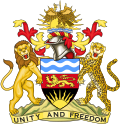Post-colonial policy (1964–1992)
The colonial structures of Malawian labour export to South African mines continued after Malawi achieved independence in 1964. Led by the then named president for Life Hastings Banda, Malawi was the only African ruled country to maintain close relations with White-ruled South Africa until the 1994 election of Nelson Mandela. Malawians were viewed as important workers in the South African mines due to their "skills, work discipline and lack of militancy". [3]
Banda's apartheid-era policy
Malawi was the only country in Africa to maintain diplomatic relations with South Africa during the apartheid era. [4] Hastings Banda was the first black President ever to visit South Africa in 1971 and the first foreign head of state to come since the United Kingdom's King George VI's royal visit in 1947. [5] During his visit, Banda received a 21-gun salute and an official welcome from State President Jacobus Johannes Fouché. [5] White students at the Stellenbosch University applauded him and sang accolades. [5] Following a state visit by South African Prime Minister John Vorster to Malawi in 1970, Banda was quoted as saying: "We have to start talking to each other. I go to South Africa. You come here. I allow your people to come here and see how the people live. This might not solve the problem today, next month, in five years, ten years, or even twenty years. But I honestly believe that this in the end is the only solution." [6] His position on South Africa was that "It is only contact like this [between South Africa and Malawi] that can reveal to your people that there are civilised people other than white..." [6] However, his non-isolationist approach to the National Party-ruled apartheid government alienated him from other African countries and Pan Africanist leaders who had just gained independence. [7] By visiting South Africa, he had defied the 41-member Organisation of African Unity (OAU). [5] Tanzania's government paper called on the OAU to expel Malawi in order to isolate Banda and "further alienate Banda from all those who believe in the equality of man." [5] Kenyan newspaper the Daily Nation thought his visit to South Africa would "set into motion a train of diplomatic events that may well make nonsense of Africa's commitment to the liberation of the millions of black people who still live under colonial or racist subjugation" if other African leaders followed suit. In response, Banda called African leaders hypocrites, highlighting that they oppressed their own people but preached unity and equality. [5]
Banda-era transition period 1990–1994
During the transition period for both Malawi (transitioning from one party to multi-party democracy) and South Africa (transitioning from Apartheid to a multi-party democracy), the Malawian government's future relations with South Africa were not secure due to Malawi's past relationship with the apartheid government. Some leaders of the anti-apartheid movement did not support the Banda government or retaining ties with Malawi. South Africa was Malawi's largest trading partner and host to many Malawian labourers so relations with South Africa was still vital to Malawi. From 1988 to 1992, around 13,000 Malawian migrant labourers were forcefully repatriated out of South Africa. The official explanation for these repatriations was that 200 Malawians had tested positive for HIV in the previous two years; however, many believe that it was due to the need for retrenchment of labourers during a crisis in South Africa's mining industry. [3]
The Malawian government made efforts to set straight its stance on South Africa by hosting ANC leader Nelson Mandela. A visit which was made possible due to efforts by Malawian diplomats resident in South Africa, including acting Ambassador Percy Kachipande. It was revealed shortly afterwards, that Kamuzu Banda had been secretly assisting the ANC during the apartheid era. The Malawian government pledged election support and continued support to the ANC government and diplomatic relations continued between the two countries.
Post-transition era reactions to Banda's policy (1994–1999)
In a submission to the Truth and Reconciliation Commission by former South African State President F W De Klerk of the National Party, De Klerk argued that sanctions and isolation against South Africa by the international community were a factor in dismantling apartheid but "more often than not, they served to retard reform rather than stimulate it." [8] De Klerk notes that,
- "The Government was always more inclined to listen to the advice of countries that maintained contact with it...the decision of Malawi to send black diplomats to Pretoria was far more effective in exposing the logical and logistical absurdities of apartheid than any number of resolutions by the United Nations." [8]

